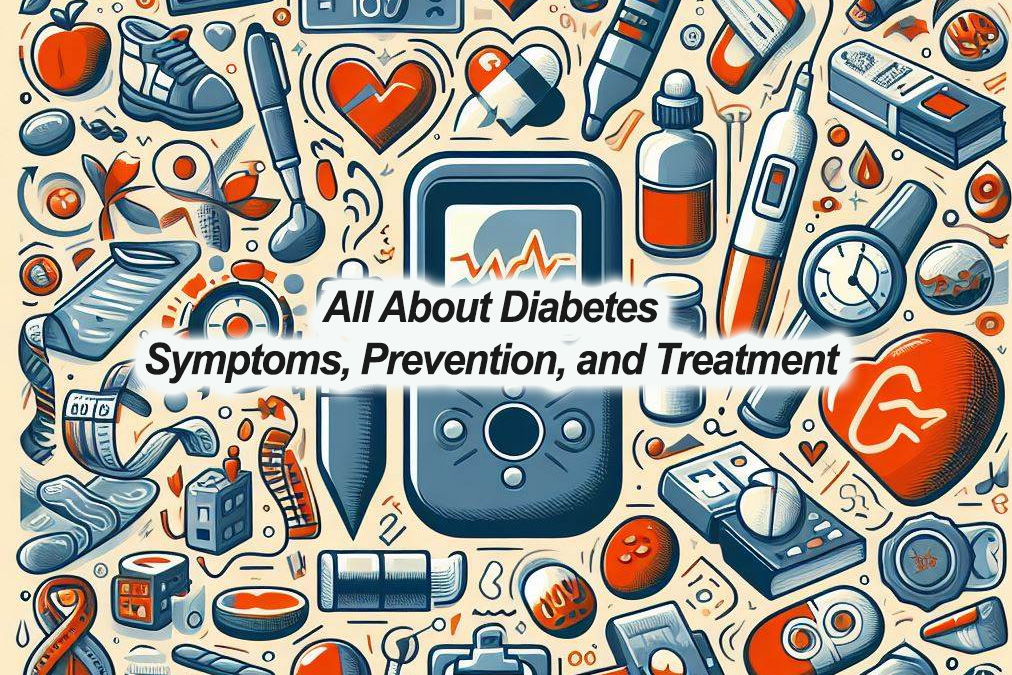Diabetes is a chronic condition characterized by high blood sugar levels, either due to inadequate insulin production or the body’s inability to use insulin effectively. Understanding the symptoms, prevention strategies, and treatment options for diabetes is crucial for managing the condition effectively.
Symptoms of Diabetes
- Frequent Urination: Excessive urination, particularly at night, is a common symptom of diabetes as the body tries to rid itself of excess sugar through urine.
- Increased Thirst: Dehydration from frequent urination can lead to increased thirst.
- Unexplained Weight Loss: Despite increased appetite, individuals with diabetes may experience unexplained weight loss due to the body’s inability to properly utilize glucose for energy.
- Fatigue: Feeling tired and lethargic is common, as cells are unable to receive adequate energy from glucose.
- Blurred Vision: High blood sugar levels can cause temporary changes in the shape of the eye’s lens, leading to blurred vision.
- Slow Healing of Wounds: Diabetes can impair the body’s ability to heal wounds, leading to slow healing or frequent infections.
- Tingling or Numbness: Nerve damage (neuropathy) caused by diabetes can result in tingling, numbness, or pain, especially in the hands and feet.
Prevention of Diabetes
- Maintain a Healthy Weight: Being overweight or obese increases the risk of developing type 2 diabetes. Adopting a healthy diet and regular exercise routine can help manage weight and prevent diabetes.
- Eat a Balanced Diet: Focus on consuming a diet rich in fruits, vegetables, whole grains, lean proteins, and healthy fats. Limit the intake of processed foods, sugary beverages, and high-fat foods.
- Exercise Regularly: Physical activity helps improve insulin sensitivity and lower blood sugar levels. Aim for at least 30 minutes of moderate-intensity exercise most days of the week.
- Monitor Blood Sugar Levels: If you have prediabetes or are at high risk of developing diabetes, monitoring your blood sugar levels regularly can help detect any changes early and take preventive measures.
- Limit Alcohol Consumption: Excessive alcohol consumption can contribute to weight gain and increase the risk of developing type 2 diabetes. Limit alcohol intake to moderate levels.
- Quit Smoking: Smoking increases the risk of developing diabetes and complicates its management. Quitting smoking can improve overall health and reduce the risk of diabetes-related complications.
Treatment of Diabetes
- Lifestyle Modifications: For type 2 diabetes, lifestyle changes such as diet modification, regular exercise, and weight management are often the first line of treatment.
- Medications: Oral medications or injectable insulin may be prescribed to help lower blood sugar levels and improve insulin sensitivity in type 2 diabetes. Type 1 diabetes requires insulin therapy to manage blood sugar levels effectively.
- Blood Sugar Monitoring: Regular monitoring of blood sugar levels is essential for diabetes management. This helps individuals make necessary adjustments to diet, exercise, and medication to keep blood sugar levels within target range.
- Healthy Eating: Following a balanced diet that includes complex carbohydrates, lean proteins, healthy fats, and fiber is crucial for managing blood sugar levels and preventing complications.
- Regular Exercise: Engaging in regular physical activity helps improve insulin sensitivity, lower blood sugar levels, and manage weight.
- Monitoring and Managing Complications: Diabetes increases the risk of various complications, including heart disease, kidney disease, nerve damage, and eye problems. Regular check-ups with healthcare providers and proper management of these complications are essential for overall health.
- Continuous Education and Support: Education about diabetes management, including self-care practices, healthy eating, and medication management, is crucial. Support from healthcare professionals, diabetes educators, and support groups can also help individuals cope with the challenges of living with diabetes.
Conclusion
Diabetes is a serious condition that requires careful management to prevent complications and maintain overall health. By understanding the symptoms, prevention strategies, and treatment options for diabetes, individuals can take control of their health and lead fulfilling lives despite the challenges of the condition. Regular monitoring, healthy lifestyle choices, and ongoing support from healthcare professionals are essential for successful diabetes management.

